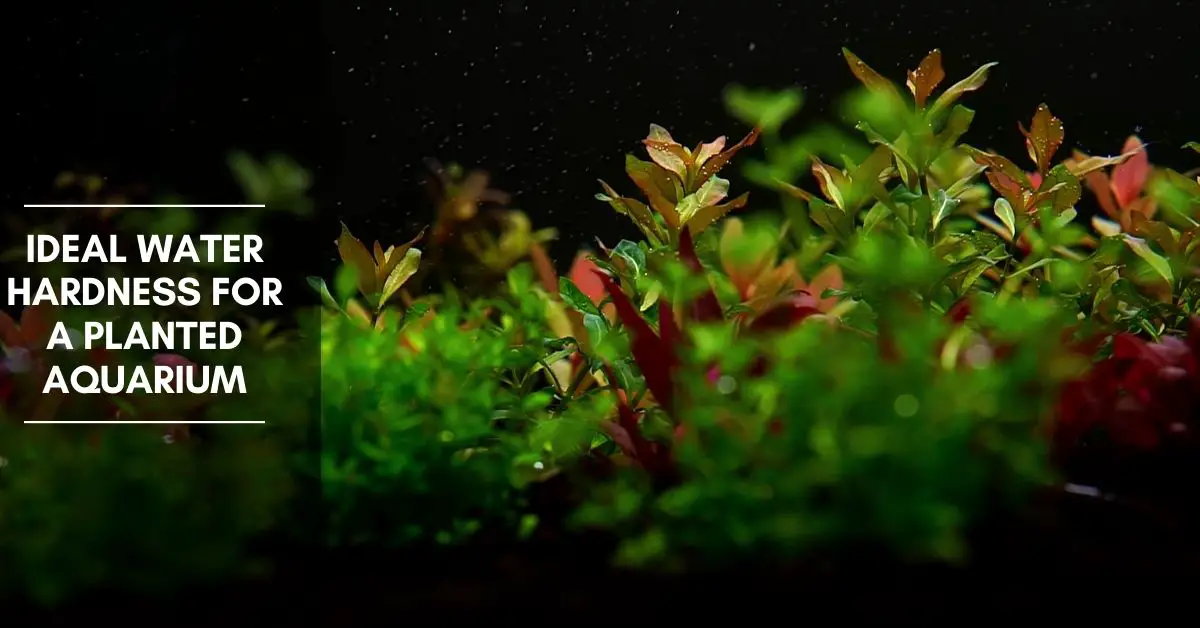Today even most novice aquarists know that water can be “hard” or “soft.” Hardening agents are the salts of calcium and magnesium, primarily. Calcium and magnesium are earth alkaline metals. Water that contains many of these mineral salts is called hard; water that contains little of them is called soft.
Aquarists state the water hardness (total hardness) in hardness grades (1° dH corresponds to 10 mg oxide of calcium or magnesium in 1 liter of water). Modern water chemistry utilizes the concept “the sum of earth alkalis” and measures in mols per cubic meter. The following broad categories have come into use:
- 0 to 4° dH = Very soft water
- 5 to 8° dH = Soft water
- 9 to 12° dH = Medium hard water
- 13 to 20° dH = Hard water
What is the best water hardness for a planted tank?
Water with a hardness value of 8 to 16° dH has proven best for the care of most plants and fish. Only a few tropical plants need softer water, for example, Aponogeton rigidifolius.
For these and for raising many tropical fish – the water must be softened either with chemicals or, more effectively, with an ion-exchanger. You can leam the hardness grade of your water supply from your waterworks. In case you need to measure it yourself, you can get indicator liquids and measuring equipment in a pet store.
How do I softening or hardening my KH and GH in my tank?
If you want to keep fish and plants for your freshwater aquarium other than those that are acclimated to the general level of hardness of your water supply, you must harden or soften the water.
Fluval Bug Bites Bottom Feeder Fish Food, Granules for Small to Medium Sized Fish, 1.60 Oz., A6586
$3.81 (as of June 26, 2025 22:22 GMT +03:00 - More infoProduct prices and availability are accurate as of the date/time indicated and are subject to change. Any price and availability information displayed on [relevant Amazon Site(s), as applicable] at the time of purchase will apply to the purchase of this product.)Ultum Nature Systems Ultra Clear Rimless Aquarium - Low Iron Glass Fish Tank with 45° Mitered Edges, 5mm-15mm Thick, Leveling Mat Included - 60S, 5mm Glass (23.62x14.17x7.08IN | 60x36x18CM)
$197.99 ($197.99 / Count) (as of June 26, 2025 22:55 GMT +03:00 - More infoProduct prices and availability are accurate as of the date/time indicated and are subject to change. Any price and availability information displayed on [relevant Amazon Site(s), as applicable] at the time of purchase will apply to the purchase of this product.)Boyd Enterprises CPGNnano5 Chemi-Pure Green Nano 5 Pack Aquarium Filtration
15% OffThe best way to remove hardness is actually to use something called an ion-exchange resin.
What is ion exchange resin?
These resin have a fixed anionic lattice, a bit like clay, initially balanced by positive sodium ions. As hard water flows through the calcium ions are exchanged for the sodium ions, so that the calcium ions sort of stick to the clay, and the sodium ions come out into the water. In this way, the water is softened because the calcium is no longer there.
Obviously, after a time, the resin gets full of calcium ions and you have to reactivate it. To do this you pour a very concentrated salt solution that sodium chloride solution so that it’s high enough to reverse the reaction, and the calcium chloride comes out in solution, and the column is again full of sodium ions and ready for use.
Carbonate hardness (Alkalinity) in planted aquarium
Not only is the sum of the earth alkalis (total hardness) important for plants; the compounds that calcium and magnesium enter into with carbonic acid are also important. These play a vital role in the nutrient economy of the plant.
Carbonic acid is formed when CO2 dissolves in water. Most of this dissolved gas remains as free CO2 in solution; only a tiny portion (0.7 percent) combines with water to become carbonic acid.
The calcium and magnesium salts of the carbonic acid produce the carbonate hardness. The hardness produced by sulfates and other compounds of magnesium and calcium, is the noncarbonate hardness.
The total hardness of aquarium water (the sum of the earth alkalis) is, therefore, the sum of carbonate hardness and noncarbonate hardness.
Carbonate hardness is very important for plant maintenance, so it is measured separately; measuring reagents with precise instructions for their use are available at the pet store. High carbonate hardness can be reduced by means of an ion exchanger, peat filter, or CO2 fertilizer. For a serious deficiency of carbonate hardness install a CO2-fertilizing apparatus.
Carbonate hardness often undergoes wide fluctuations in the aquarium because of the photosynthetic activities of the plants. This influences the pH value.
To understand this process you need to know that the hardening agents calcium and magnesium form two different compounds with carbonic acid:
- bicarbonates
- carbonates
Bicarbonates are unstable compounds; carbonates are almost insoluble in water. The harder natural water is, therefore, the more CO2 is bound in bicarbonates and carbonates and the more alkaline it is. Soft water in nature is slightly acidic because it contains only few hardeners that can bind the CO2.




















